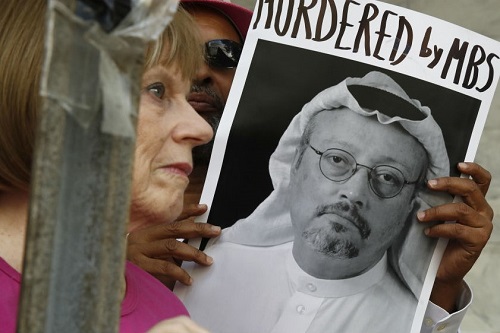Reuters photo
By
Awesu Olaniyi Williams
A man went to his consulate office in another country with his girlfriend. Technically when you step on the floor of your country’s embassy abroad it is assumed under international law that you are on home soil.
Knowing he isn’t on good terms with his home country’s government, especially the new Crown Prince of the Kingdom of Saudi Arabia, he instructed his girlfriend to alert the Turkish government if he didn’t come out of the consulate. Media reports are rife with the narrative of the girlfriend alerting authorities 11 hours later. He went in on the 2nd of October, 2018 and never again was he seen.
Jamal Khashoggi’s case has set a dubious example within the international scene, one that says strongman politics are not answerable to their actions, particularly at a time when journalists are increasingly facing crackdowns. While the bare face hypocrisy of Washington is being felt on this matter there are growing concerns about the role of democracy and the freedom of the press as a founding principle of western democracies, and if such evil can thrive without corresponding sanctions.
Reports emerging from the Turkish media suggest that Mr. Khashoggi has been murdered and dismembered by officials flown from the Kingdom acting under instruction. Interestingly the shifting responses coming from the Saudi administration leave less to be desired. From the outright falsehood of Mr. Khashoggi having earlier been said to have left the consulate to a certain altercation leading to the explanation of his death, one point stands out clearly: being a journalist doesn’t protect you from harm.
There have always been recorded happenings where government crackdowns on dissidents or their nationals overseas using back channels. One that readily comes to mind was the embarrassing situation the Nigerian government fell into on July 5, 1984. On this occasion the body of Umaru Dikko, who had earlier served in the government of Shehu Shagari (1979-1983)as Transport Minister and head of the presidential task force on rice, was found in a crate labelled ‘diplomatic bag’, drugged and about to be transported to Lagos, Nigeria from Stansted airport, UK.
The sting operation was purportedly masterminded by the Nigerian military government headed by General Muhammdu Buhari and the Israeli intelligence agency. Whilst the Dikko Affair might have happened more than 30 years ago to an exiled former Minister, the outpour of outrage understandably seems to follow a similar pattern in the ongoing Jamal Khashoggi case.
Admittedly, a bad message and example is being set by the whitewashing stand Washington and her Saudi allies are taking, a signal to an ever increasing volatile environment journalists are working under, this an unfortunate echoing that one’s life in pursuant of truth, freedom and justice isn’t worth anything when corporate interest on weapon sales is at risk.
To this end we are heading into a dark alley in history when an assault on a news reporter is widely cheered and commended by the President. The end of the Khashoggi case might not yet be in sight, but importantly, this is the time when we must all learn to speak with one voice and call evil and violations of rights what they truly are.
Awesu Olaniyi Williams
Awesu Olaniyi is an award winning, Nigerian born public speaker, freelance writer and education advocate/volunteer with Slum2school Africa who his intrigued by the intersectional role between journalism, democracy and public enlightenment.



No Comments Yet!
You can be first to comment this post!